
Foot Loose & Fancy Free is the eighth studio album by Rod Stewart, released in November 1977 on Riva Records in the UK and Warner Bros in the US.

The singles discography of Eric Clapton consists of 24 early career singles that Clapton recorded with various groups and singers including The Yardbirds, John Mayall & the Blues Breakers, Cream, John Lennon and the Plastic Ono Band as well as Derek and the Dominos. As a solo performer, Clapton released 91 singles and various promotional formats from 1970 to date. His most commercially successful singles are "Lay Down Sally", "Wonderful Tonight", "Change the World", "Tears in Heaven" and Bob Marley's "I Shot the Sheriff", released in 1974, charting substantially better than Marley's own earlier release had, becoming a Billboard Hot 100 number-one hit.

Just a Boy is the second album by English singer-songwriter, Leo Sayer, and was released in 1974. It features his interpretations of two songs written by Sayer and David Courtney for the Who's lead vocalist Roger Daltrey's debut album, Daltrey. Sayer's singles "One Man Band" and "Long Tall Glasses" both hit the charts in the UK and around the world. Leo Sayer was now popular in Europe and made many promotional appearances there. He headlined in Paris at the Théâtre des Champs-Élysées, the venue known as the home of his then-hero, mime artist Marcel Marceau.

Endless Flight is the fourth album by English singer-songwriter Leo Sayer, which was released in 1976. It was released in the US and Canada by Warner Bros. Records and in the UK by Chrysalis Records.

Thunder in My Heart is the fifth album by the English singer-songwriter Leo Sayer, released in 1977. In 2006, a remixed dance version of the track, entitled "Thunder in My Heart Again", was released, credited to Meck featuring Leo Sayer. It reached No. 1 in the United Kingdom, and No. 16 in Australia. Along with a follow-up single, "Easy to Love", the song reached the Top 40 in the US and Canada.

Me Myself I is the sixth studio album by British recording artist Joan Armatrading. Released in May 1980, the album was Armatrading's highest ever chart placing both in the UK and in the US. In Australia, the album peaked at number 13. It was certified "Gold" in the UK by the BPI in July 1980.
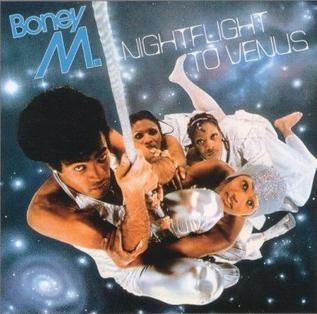
Nightflight to Venus is the third studio album by Euro-Caribbean group Boney M., and was released in June 1978. The album became a major success in continental Europe, Scandinavia, and Canada, topping most of the album charts during the second half of 1978 and also became their first UK number one album. In Canada, it received a nomination for a 1980 Juno Award in a category 'International Album of the Year'.
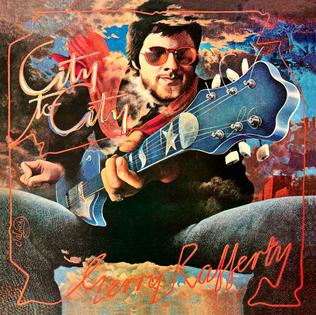
City to City is the second solo studio album by Scottish singer-songwriter Gerry Rafferty, released on 20 January 1978 by United Artists Records. It was Rafferty's first solo release in six years—and first release of any kind since 1975—due to his tenure in the band Stealers Wheel and subsequent legal proceedings which prevented Rafferty from releasing any new solo recordings for the next three years. The album was well received, peaking at No. 1 in the US and going Platinum, as well as reaching No. 6 in the UK Albums Chart and achieving Gold status. "Baker Street", "Right Down the Line" and "Home and Dry" were hits on the American charts.

The Woman in Red: Original Motion Picture Soundtrack is the second soundtrack album released by American musician Stevie Wonder on the Motown label. Also featuring Dionne Warwick, the album was released in 1984 for the film of the same name. It features Wonder's biggest hit, "I Just Called to Say I Love You", which hit number one internationally and won the Academy Award for Best Original Song, and also features the follow-up hit, "Love Light in Flight" and "Don't Drive Drunk", the song and the accompanying music video for which were used in the Ad Council and the US Department of Transportation's Drunk Driving Prevention public service announcement the following year.

American rock band Aerosmith has released 15 studio albums, nine live albums, 16 compilation albums, two extended plays, and 72 singles. Aerosmith was formed in Boston, Massachusetts in 1970 by vocalist Steven Tyler, guitarists Joe Perry and Ray Tabano, bassist Tom Hamilton, and drummer Joey Kramer. Tabano was replaced by Brad Whitford in 1971. Other than a period from 1979 to 1984, this lineup has remained the same.
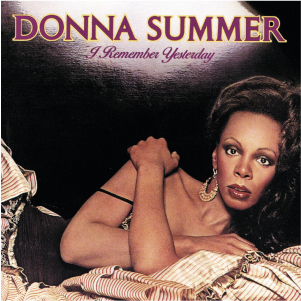
I Remember Yesterday is the fifth studio album by American singer-songwriter Donna Summer. It was released on May 13, 1977, seven months after the release of her previous album. Like her previous three albums, it was a concept album, this time seeing Summer combining the recent disco sound with various sounds of the past. I Remember Yesterday includes the singles "Can't We Just Sit Down ", "I Feel Love", the title track, "Love's Unkind" and "Back in Love Again". "I Feel Love" and "Love's Unkind" proved to be the album's most popular and enduring hits, the former of which came to be one of Summer's signature songs.
Machinations are an Australian synthpop band which formed in 1980. They reached the top 20 on the Kent Music Report albums chart with Big Music in 1985. Their top 30 hits on the related singles chart are "Pressure Sway", "No Say in It", "My Heart's On Fire" and "Do to You". By 1989 the group had disbanded. They briefly reunited in 1997 and then reformed in 2012.

American-born Swiss singer Tina Turner released nine studio albums, three live albums, two soundtracks, and six compilation albums. Widely referred to as the "Queen of Rock 'n' Roll", Turner had reportedly sold around 100 to 150 million records worldwide, making her one of the best-selling female artists in music history. According to Recording Industry Association of America, Turner has certified sales of 10 million albums in the US, alone.
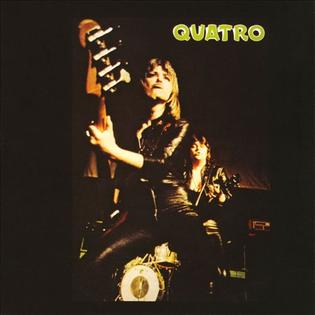
Quatro is Suzi Quatro's second album, released in October 1974 by Rak Records as SRAK 509, with the exceptions of the United States and Canada, Japan and several territories in Europe.

"Now We're Getting Somewhere" is a 1986 song by rock group, Crowded House. It was the third single from the group's debut album Crowded House. It is the only single from that album to not appear on any of the band's greatest hits albums; Recurring Dream & The Very Very Best of Crowded House. It was the first single to feature the song, "Recurring Dream", as a B-Side. "Now We're Getting Somewhere" peaked at No. 63 on the Australian Kent Music Report singles chart, and No. 33 in New Zealand.

"Bring On the Dancing Horses" is a single by the English rock band Echo & the Bunnymen, released on 7 October 1985. It was the only single from their 1985 compilation album Songs to Learn & Sing and was recorded for the John Hughes film Pretty in Pink (1986). The song reached number 21 on the UK Singles Chart and number 15 on the Irish Singles Chart.
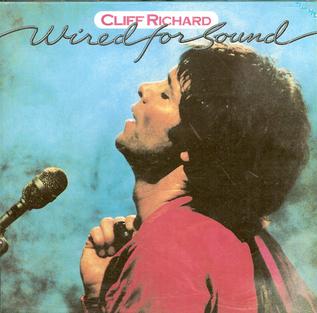
Wired for Sound is the 24th studio album by Cliff Richard, released in September 1981. The album peaked at number 4 in the UK album charts upon release, and spent a total of 25 weeks on the chart in 1981–82. The album was certified Platinum by the BPI, and achieved global sales of over one million.

"Breakin'... There's No Stopping Us" is a song by American music duo Ollie & Jerry. The song was released on June 21, 1984, as the first single from the soundtrack to the 1984 film Breakin'. The song reached number nine on the US Billboard Hot 100 and number five on the UK Singles Chart. It topped the US dance charts for one week. It is the theme song to the film Breakin'. The drums were created using the Roland TR-808 drum machine.

The discography of British-Irish musician Chris de Burgh consists of 24 studio albums, 9 compilation albums, 4 live albums, and 66 singles, along with 8 videos and DVDs and one box set. His 23 studio albums consist of 19 of completely new material, 2 albums of cover versions, 1 album featuring a mix of new songs, cover versions, and re-recordings and 1 consisting of acoustic versions of previously released tracks. His debut album, Far Beyond These Castle Walls, released in 1974, reached number 1 in Brazil, but failed to chart elsewhere.
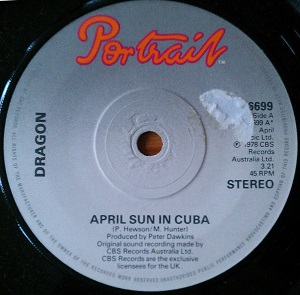
"April Sun in Cuba" is a song recorded by New Zealand group Dragon, released in October 1977. It is the first single to be released from Dragon's fourth studio album Running Free. "April Sun in Cuba" first charted on 7 November 1977, peaking at number 2 on the Kent Music Report Singles Chart and staying on the chart for 22 weeks. It also reached number 9 on the New Zealand singles chart. The b-side of the single, a non-album track called "Telephone", was credited to "Dr. Agony".


















